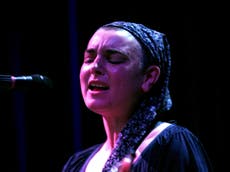I can’t believe I agree with Morrissey, but he’s right on Sinéad O’Connor
Her influence cannot be overlooked: she was a trailblazer, an activist. Sinéad was the first proponent of #MeToo, decades before it became a global movement. To me, she was a prophet

I don’t often agree with Morrissey, but I thought he put it well when he raged that “the cruel play-pen of fame gushes with praise” for Sinéad O’Connor now she has died, but “hadn’t the guts to support her when she was alive and she was looking for you.”
He’s right: Sinéad paid a hard price for her honesty. She was mocked, ignored and sidelined by a music industry that has become sterile and safe.
A victim of childhood abuse herself, Sinéad was the first proponent of #MeToo, decades before it became a movement in 2017. When #MeToo took off, people kept asking why more stars hadn’t already spoken out against abuse. But Sinéad was doing it back in 1992, when she ripped up a picture of the Pope on Saturday Night Live, to protest against child abuse in the Catholic Church.
She was forever speaking her mind and taking action. She refused to play “The Star-Spangled Banner” before a show and then boycotted the Grammy Awards the year she was nominated. She told the organisers that she believed artists should “always speak the truth and never keep it hidden, even though we are operating in a world which does not like the sound of the truth”.
The world couldn’t knock that out of her. Sinéad remained a fearless, and often vindicated, truth-teller: she was reviled by many Pogues fans when she reported Shane MacGowan to the police for heroin use, but said, “I love Shane, and it makes me angry to see him destroy himself selfishly in front of those who love him.” MacGowan later credited that moment with him kicking the drug.
Many were less magnanimous than MacGowan in the face of her truths. The actor Joe Pesci said of her SNL stunt that “if it was my show, I would have gave her such a smack.” When a music critic described her as “the crazy woman in pop’s attic”, she was forced to defend herself, saying: “It’s not like I’m attacking people with knives or trying to strangle anyone or wandering around in my nightdress.”
No, she was doing something far more threatening than that: speaking the truth about the world we live in. And as many truth-tellers discover, people admire them when they’re puncturing someone else’s illusion but hate them when they’re puncturing theirs.
Her music lives on, but losing her life-force and personality is such a loss. In this Ed Sheeran era, when songs are written less to touch our hearts than to satisfy a commercial algorithm, and in which artists don’t rage against the machine but bow down in front of it at royal concerts and on exploitative reality shows, we are sorely in need of characters like her.
What artist is there now who would warn Miley Cyrus that she is being “pimped” by the industry, who would tell Simon Cowell he “murdered” the industry, or Piers Morgan that he was “dying to be b**** deep in Meghan Markle so bad it’s driven you crazy”?
It’s true that artists do speak more about social issues these days, but not with the courage, rage and recklessness of Sinéad. A modern pop star joining a hashtag on social media, after careful discussions with their management team, is not the same as tearing up a photograph of a holy man live on US TV. It’s really the opposite of that.
She had a volatile relationship with religion, which saw her ordained as a priest, then ask three successive popes to excommunicate her, and describe the Vatican as “a nest of devils” where Christ was “being murdered by liars”. Then she converted to Islam, which she called “the natural conclusion of any intelligent theologian’s journey.
All of that confused a lot of people, but to me it was beautiful and made perfect sense. Sinéad spoke from the heart, no matter the consequences – and had a furious devotion to the truth. I think she wanted to find a home where that was welcome. Although I enjoyed her music, it was this divinity that I adored and which made me cry when I heard she had died. To me, Sinéad was a prophet.
I wonder what she would make of today’s chorus of praise, a lot of it from people who had nothing good to say about her in life. Well, she can rest in glory, knowing she was right. Just after the sexual abuse scandal in the Catholic church had been exposed, a mural appeared on a wall in Dublin wall. It said: “Sorry Sinéad, you were right all along.”





Join our commenting forum
Join thought-provoking conversations, follow other Independent readers and see their replies